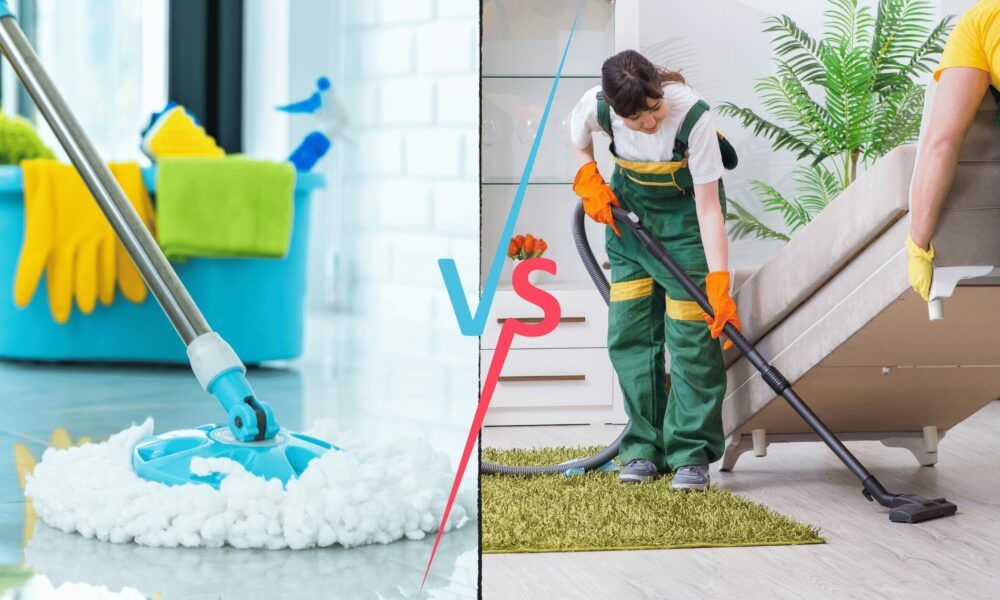Why Regular Deep Cleaning is Essential for Both Homes and Businesses

Introduction: The Impact of Deep Cleaning on Health and Productivity
In both residential and commercial settings, maintaining a clean environment is crucial for the well-being of occupants. While regular cleaning routines are essential for day-to-day tidiness, they often leave behind hidden dirt, dust, and allergens that accumulate over time. This is where deep cleaning comes into play. Regular deep cleaning goes beyond the surface to target areas that are often overlooked, ensuring a healthier and more productive environment for everyone.
In this article, we will explore the importance of deep cleaning for both homes and businesses, the benefits it provides, and why it should be an integral part of any cleaning regimen.
The Difference Between Regular Cleaning and Deep Cleaning
Surface Cleaning vs. Deep Cleaning
Regular cleaning focuses on maintaining a clean and orderly appearance, often involving tasks like dusting, vacuuming, mopping, and wiping down surfaces. While these tasks are necessary for daily upkeep, they typically only address surface-level dirt and grime.
Key Characteristics of Regular Cleaning:
- Dusting and Wiping: Regular cleaning involves dusting surfaces like countertops, tables, and shelves, as well as wiping down frequently touched areas such as doorknobs and light switches.
- Vacuuming and Mopping: Floors are vacuumed or mopped to remove visible dirt and debris, keeping the area tidy and presentable.
- General Tidying: Regular cleaning often includes tasks like organizing clutter, taking out the trash, and ensuring that spaces look neat.
While regular cleaning is effective for maintaining cleanliness on a day-to-day basis, it does not address the buildup of dirt and contaminants in hard-to-reach areas.
What Deep Cleaning Entails:
- Thorough Cleaning: Deep cleaning involves a more comprehensive approach, targeting areas that are often missed during regular cleaning. This includes scrubbing grout, cleaning behind and under appliances, and deep-cleaning carpets and upholstery.
- Disinfection: In addition to cleaning, deep cleaning often involves disinfecting surfaces to eliminate bacteria, viruses, and other harmful microorganisms. This is particularly important in high-traffic areas and spaces where hygiene is a top priority.
- Detailed Attention: Deep cleaning focuses on the details, such as cleaning light fixtures, vents, baseboards, and other areas that are not typically included in regular cleaning routines.
By understanding the differences between regular cleaning and deep cleaning, it becomes clear why both are necessary to maintain a truly clean and healthy environment.
The Health Benefits of Regular Deep Cleaning
Reducing Allergens and Respiratory Issues
One of the most significant benefits of deep cleaning is its ability to reduce allergens and improve indoor air quality. Dust, pet dander, pollen, and other allergens can accumulate in homes and businesses, contributing to respiratory issues and allergies.
How Deep Cleaning Improves Air Quality:
- Elimination of Dust and Allergens: Deep cleaning removes dust and allergens from areas that are often overlooked during regular cleaning, such as behind furniture, in air ducts, and in carpet fibers.
- Vent and Filter Cleaning: By cleaning air vents, filters, and HVAC systems, deep cleaning helps to ensure that the air circulating through the space is free of contaminants. This is especially important for individuals with asthma or allergies.
- Mold Prevention: Deep cleaning can also help prevent mold growth by thoroughly cleaning damp areas such as bathrooms, kitchens, and basements. Mold spores can trigger respiratory issues and are particularly harmful to individuals with compromised immune systems.
By regularly deep cleaning your home or business, you can create a healthier environment that reduces the risk of respiratory problems and improves overall well-being.
Preventing the Spread of Illness
In both homes and businesses, preventing the spread of illness is a top priority. Deep cleaning plays a crucial role in maintaining a sanitary environment by targeting areas where germs and bacteria are likely to thrive.
Sanitizing High-Touch Areas:
- Disinfecting Surfaces: During deep cleaning, high-touch surfaces such as door handles, light switches, and restroom fixtures are thoroughly disinfected to eliminate germs. This reduces the likelihood of illness spreading among occupants.
- Kitchen and Breakroom Hygiene: Kitchens and breakrooms are common areas where bacteria can multiply, especially on surfaces like countertops, sinks, and appliances. Deep cleaning ensures these areas are sanitized, reducing the risk of foodborne illnesses.
- Restroom Sanitation: Restrooms are another critical area that benefits from deep cleaning. Regular disinfection of toilets, sinks, and floors helps prevent the spread of bacteria and viruses, promoting a healthier environment.
By incorporating deep cleaning into your routine, you can significantly reduce the presence of harmful germs and bacteria, creating a safer space for everyone.
Enhancing Productivity in the Workplace
The Connection Between Cleanliness and Productivity
A clean and well-organized workspace is essential for maintaining high levels of productivity. Employees are more likely to feel motivated and focused in an environment that is free from clutter and distractions. Regular deep cleaning contributes to this by ensuring that all areas of the workplace are clean, hygienic, and conducive to productivity.
How Deep Cleaning Boosts Productivity:
- Improved Focus: A clutter-free and clean workspace minimizes distractions, allowing employees to focus on their tasks without being hindered by mess or disorganization.
- Enhanced Morale: Working in a clean environment boosts employee morale and job satisfaction. Employees are more likely to take pride in their work and feel valued when their workplace is well-maintained.
- Reduced Sick Days: Deep cleaning reduces the spread of illness, leading to fewer sick days and higher overall productivity. When employees are healthy, they can perform at their best and contribute to the success of the business.
By prioritizing deep cleaning in the workplace, businesses can create an environment that supports employee well-being and productivity.
Maintaining a Professional Image
For businesses, maintaining a clean and professional image is essential for attracting and retaining clients. A well-maintained space reflects positively on the company and demonstrates a commitment to quality and attention to detail.
The Role of Deep Cleaning in Professionalism:
- Client Impressions: First impressions matter, and a clean business environment sets the tone for a positive client experience. Deep cleaning ensures that all areas, including lobbies, meeting rooms, and restrooms, are immaculate and presentable.
- Brand Reputation: A clean and hygienic workspace reinforces the company’s brand image, showing that the business values cleanliness and professionalism. This can be a key factor in building trust with clients and partners.
- Compliance with Health and Safety Standards: Many industries have strict health and safety standards that must be met. Regular deep cleaning helps businesses comply with these regulations, avoiding potential fines and legal issues.
Investing in deep cleaning in South Florida is an investment in your company’s image, reputation, and long-term success.
Long-Term Benefits of Deep Cleaning
Extending the Life of Furnishings and Equipment
Deep cleaning not only improves health and productivity but also helps extend the life of furnishings, equipment, and surfaces. By regularly removing dirt, grime, and buildup, you can prevent wear and tear and maintain the appearance and functionality of your assets.
Preserving Assets Through Deep Cleaning:
- Furniture and Upholstery: Regular deep cleaning of furniture and upholstery removes stains, dirt, and allergens, keeping these items looking new and extending their lifespan.
- Carpets and Flooring: Deep cleaning carpets and hard floors removes embedded dirt and grime that can cause damage over time. This helps maintain the appearance of your floors and reduces the need for costly replacements.
- Appliances and Equipment: Deep cleaning kitchen appliances, HVAC systems, and office equipment prevents buildup that can lead to malfunctions or decreased efficiency. This not only prolongs the life of the equipment but also ensures it operates at peak performance.
By incorporating deep cleaning into your maintenance routine, you can protect your investments and avoid the high costs associated with premature wear and replacement.
Creating a Sustainable Cleaning Routine
Deep cleaning should be a regular part of your overall cleaning strategy, complementing your daily or weekly cleaning tasks. By establishing a sustainable deep cleaning routine, you can ensure that your home or business remains clean, healthy, and inviting year-round.
Building a Sustainable Deep Cleaning Schedule:
- Frequency: Determine how often deep cleaning is needed based on the specific needs of your space. For most homes and businesses, deep cleaning should be done at least quarterly, with more frequent cleanings in high-traffic areas.
- Customizing Your Approach: Tailor your deep cleaning routine to address the unique challenges of your space. Focus on areas that accumulate dirt and grime quickly, such as kitchens, bathrooms, and entryways.
- Consistency: Consistent deep cleaning is key to maintaining a clean environment. By sticking to a regular schedule, you can prevent the buildup of dirt and contaminants, making each deep cleaning session more manageable.
A well-planned deep cleaning routine helps you stay on top of maintenance and ensures that your space remains in optimal condition.
Conclusion: The Essential Role of Deep Cleaning
Regular deep cleaning is not just an added luxury—it’s an essential practice for maintaining the health, safety, and productivity of both homes and businesses. By going beyond surface cleaning and addressing hidden dirt and contaminants, deep cleaning creates a healthier environment, reduces the spread of illness, and enhances the overall appearance and functionality of your space. Whether you’re looking to protect the well-being of your family or improve the efficiency and image of your business, incorporating deep cleaning into your routine is a smart investment that delivers long-lasting benefits.
Read More From Techbullion And Businesnewswire.com





